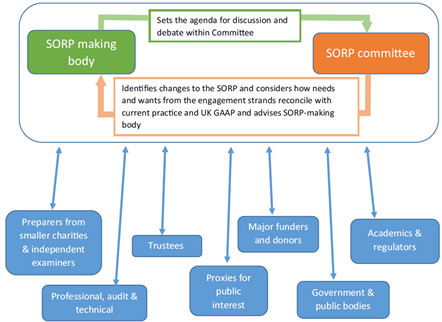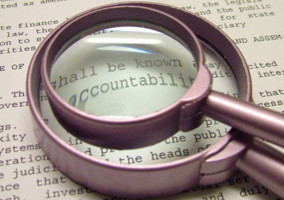For the Charities SORP, turning 30 has brought on some soul searching; what is my purpose, how have I become what I am today and what does the future hold for me? This reflection has resulted in the publication of an independent governance review of the SORP this year and a new process for developing the next SORP, which brings optimism for its future.
It may seem obvious that there should be a Charities SORP but in fact the framework is something quite special, designed to help charities report transparently on their purpose. The creation of a dedicated charity reporting and accounting framework was a welcome innovation for such an important sector. However, it is recognised that the SORP needs to be stewarded properly if it is to continue to be fit for purpose.
Since the first Charities SORP was issued in 1988 it has had many iterations, each aiming to improve on the previous. Developments in SORP has influenced the improvement in consistency of charity accounts and accountability of charities but if the SORP is to continue improving transparency and accountability it needs to adapt to the expectations of stakeholders. Research we have carried out tells us that the public care deeply about transparency when it comes to charities’ finances, so the road ahead for the SORP needs to steer charities towards that goal.
The current SORP development process involves the SORP-making-body (currently the Office of the Scottish Charity Regulator, the Charity Commission for Northern Ireland and the Charity Commission of England & Wales with the Charities Regulator (Ireland) as Observer), the Charities SORP Committee and the SORP secretariat.
The role of the SORP-making body is to oversee the development of the SORP and its publication and to ensure that the SORP is consistent with the Financial Reporting Council (FRC) approved accounting standards. They are assisted by the expert Charities SORP Committee who will continue to be central to the editing of the next SORP. But if the SORP, and charity accounts, are to truly meet the needs of those that matter (beneficiaries and the public), the views from wider groups of stakeholders must be heard loud and clear.
The independent SORP Governance Review (published June 2019) chaired by Professor Gareth Morgan considered how the future of the SORP-making process could be strengthened, and recommended just that.
It concluded: “At the heart of this Review is the aim of focusing charity financial reporting around needs of the public interest reporting and broadening the engagement of stakeholders in the process. If the panel’s recommendations are implemented in full this will provide a sound basis for ensuring the SORP is not just technically fit for purpose but delivers on what the public want to know about the charities they fund and support and from which they benefit and is a framework which better addresses the reporting needs of smaller charities.”
The SORP-making body has taken swift action in response, launching a new process for developing the next SORP including a new stakeholder engagement process involving a reformed SORP Committee, a new ongoing dialogue with engagement partners and plans to have the new process in place from 2020. Engagement partners will be separated into seven separate stakeholder groups. The engagement partners will be individuals and organisations with an interest in charity financial reporting and the work of the sector.
The stakeholders will represent the information needs of users and will discuss the extent of the change required to the SORP to meet those needs. They will also identify opportunities to simplify and remove unnecessary reporting and ensure technical compliance with Generally Accepted Accounting Principles (GAAP). Stakeholders will be engaged early on so that the SORP can be written by the SORP-making body in partnership with the Charities SORP Committee with stakeholder views and needs in mind.
The resulting draft SORP would then be put out to public consultation, the outcomes of the consultation considered and any required changes made before the SORP is submitted to the FRC for approval.
The new SORP Committee will be at the centre of the dialogue with the stakeholder groups, advising the SORP-making body and the SORP Secretariat on how to balance the feedback and ideas for change, identifying areas for debate with the stakeholder groups and assisting to identify the changes needed to the SORP whilst ensuring the SORP’s continued technical compliance with accounting standards.
The hope of the SORP-making body is that the SORP can continue to be seen as the world leading framework for charity financial reporting. Their vision is for a framework that ensures that the accounts are not simply ‘true and fair’ but that they are meaningful to users of charity reports and accounts, providing the information needed to underpin decision-making by donors, funders and others interested in the work of the sector.
The SORP-making body will be actively recruiting engagement partners, individuals or organisations, who would like to assist as well as recruiting to the SORP Committee. Those interested should keep an eye on the Charities Sorp website, where information on the roles available and application process will be published soon.

In my role at the Commission I see room for improvement every day in charities’ financial reporting. So as regulator, we welcome the prospect of a renewed SORP which will help us hold charities to account in line with the legitimate expectations of the public.
This is an important journey, and the process of improvement will not stop here. The review set out other ambitious reforms in relation to the SORP Committee and the SORP development process, which the SORP-making body intends to implement.
Together, we want to see charities thrive, and so we want to see an accounting framework that inspires public trust and confidence in the financial reporting by charities on the work that they do to improve lives and strengthen civil society.
Amie Woods is deputy head of accountancy services at the Charity Commission for England and Wales.
Related articles
|












